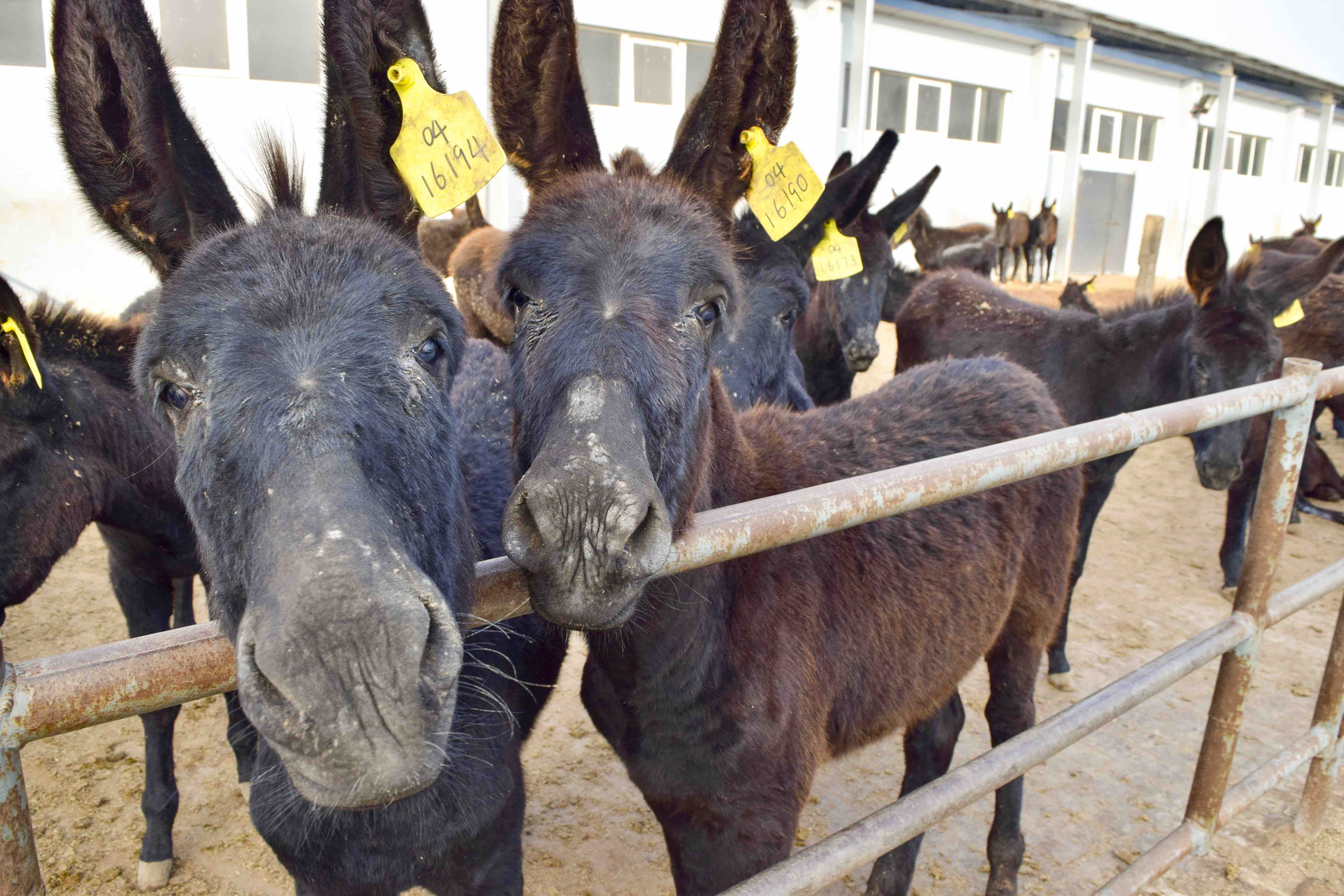
24 Aug Inside Botswana’s illegal donkey trade
Chinese traders are driving the cruel slaughter of donkeys across Southern Africa, for traditional potions that use gelatin in the hide. Investigation by Oscar Nkala
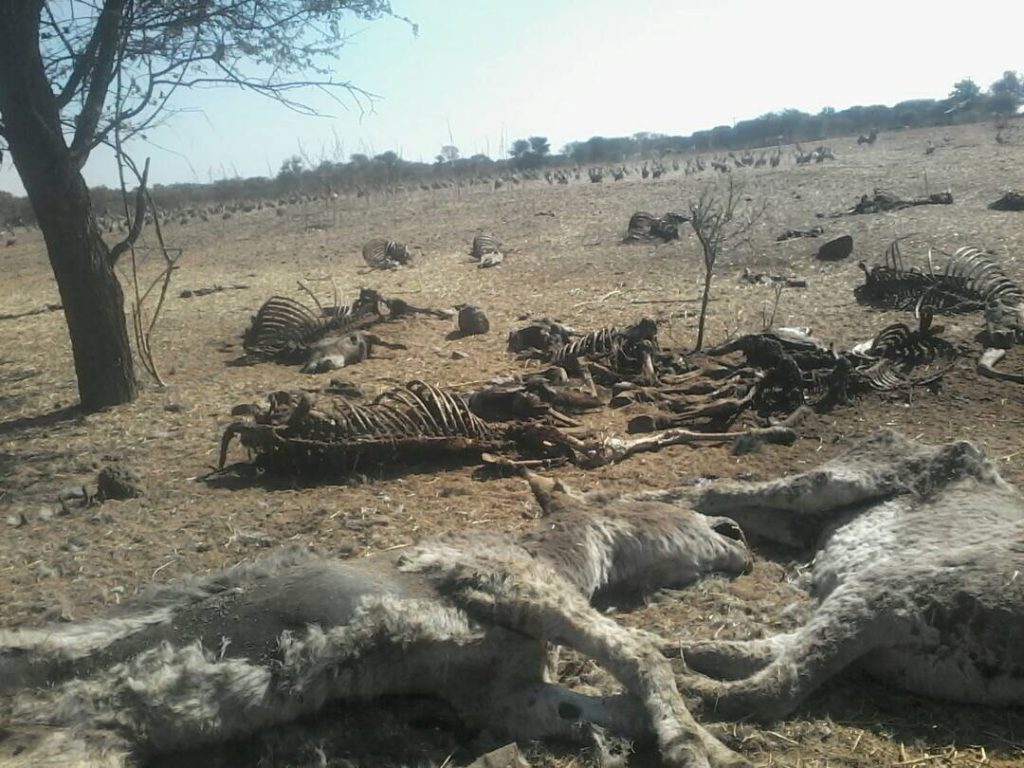
The cruel treatment and slaughter of donkeys at Bo Chang abattoir galvanised the government into temporarily suspending all licences
When Chinese businessman Daniel Wong arrived in the Kweneng district of Botswana in November 2015, he excited local councillors and thousands of poor donkey farmers by detailing how they could make millions out of exporting donkey meat and hides to China.
Wong’s proposal to partner the local council in setting up a donkey abattoir to export hides and meat to Hong Kong and China was welcomed as a high-value substitute for the loss of the beef industry, which froze in 2013 due to recurrent outbreaks of foot and mouth disease in Botswana.
With government encouragement, the Kweneng District Council approved the opening of Botswana’s first pilot donkey abattoir at Lentsweletau, one of the largest communities in Kweneng. Due to its rudimentary nature, the local authority called the little abattoir a “slaughter slab”.
Councillors Gaopalelwe Ronald and Saoqho Kotongwa said the abattoir would be a money-spinner, and would help farmers to cull the excessive regional donkey population.
Wong’s donkey abattoir plan also gained favour with the Development Advancement Institute in Botswana, a development support group. The institute’s Botswana head, Sylvester Matlho, said the project would enrich donkey farmers and help address the problem of high youth unemployment in the district.
By January 2016 Wong was operating Botswana’s first donkey “slaughter slab” on a trial basis in Kweneng, exporting the hides and processing the meat locally to make pet foods.
Wong said there were “endless” donkey export opportunities for Botswana because China’s monthly requirement of 100,000 slaughtered donkeys was not being met due to “political opposition” against the trade.
His donkey abattoir in Lentsweletau, which is still running, gave rise to the idea that donkeys could be traded for fast cash, leading to reports of theft and illegal slaughter in Molepolole, Ghanzi and the Ngamiland.
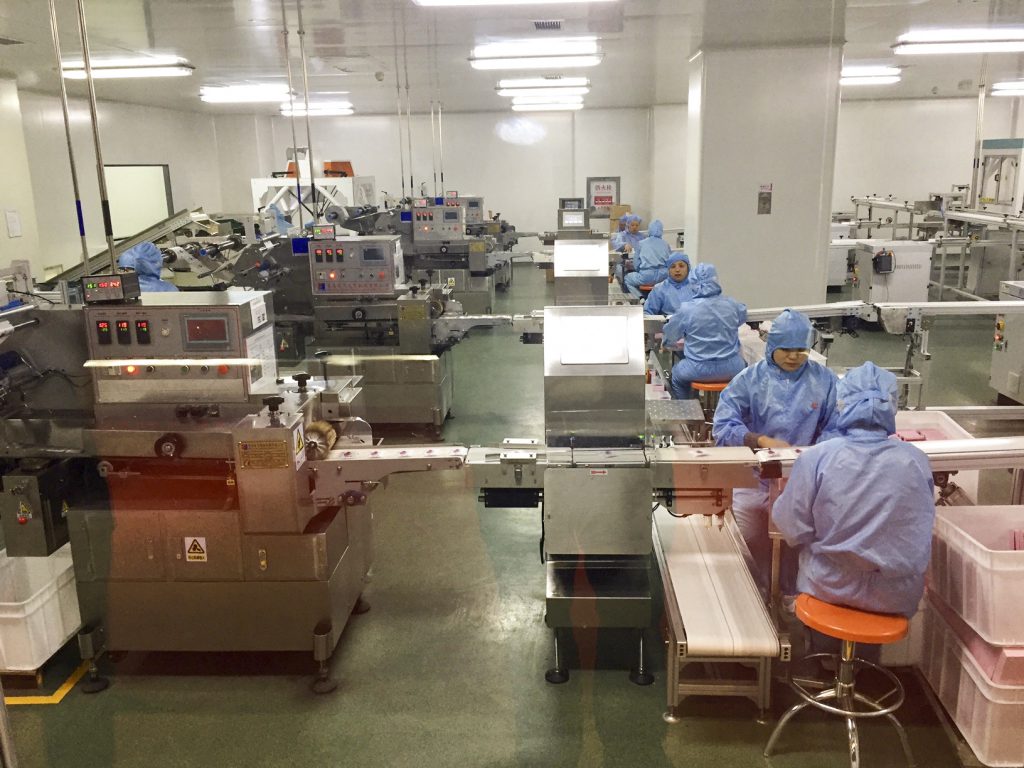
Workers at an ejiao production facility in Hong Kong. Photo © George Knowles/Hong Kong
Donkeys for Ejiao
According to the Under the Skin report published in January 2017 by The Donkey Sanctuary, a United Kingdom-based organisation that campaigns globally for donkey welfare, rural communities in Africa risk being impoverished by a “relentless” Chinese demand for donkey hides.
In China, the skins are stewed to produce gelatin, a key ingredient in the making of ejiao, a traditional Chinese medicine, according to the report.
Also known as “donkey hide glue”, ejiao is processed into gelatinous bars, pills or tonics which are used to treat medical conditions that include insomnia, dizziness, nose-bleeding and dry coughs.
It is also believed to be an anti-ageing agent, in addition to increasing libido and reducing chances for the development of reproductive organ-related diseases among post-menopausal women.
Botswana’s illegal trade
The true scale of the underground donkey hide trade spawned by Wong’s trial “slaughter-slab” experiment went unrecognised until early 2016 when police in Molepolole arrested what they called a “syndicate” of four Zimbabweans and a Chinese citizen in connection with illegal slaughter and export to Zimbabwe of 1,200 donkey hides.
A total of 897 wet and 303 dried donkey hides were found in a truck at a warehouse owned by a Motswana businessman who was licensed to export cow hides. He was charged with the illegal slaughter of the donkeys, and illegal possession and export of their hides.
All four Zimbabweans were in Botswana illegally. The names of the other three were not given, but their team leader was identified as Isaac Phiri. He told investigators that for months, they had bought and slaughtered donkeys at cattle posts in Mabutsane, Kweneng and Dutlwe on behalf of Hondge, a Chinese-owned donkey hide exporter based in Harare, Zimbabwe.
From Harare, Hongde trucked its products to the Mozambican port of Pemba for shipment to China and Hong Kong. The Chinese man, who was not identified in police reports, was found with P230,000 (about R297,000 / US$22,400) in cash. He told police that he was only in Botswana to check why the Zimbabweans had delayed a delivery of hides to Harare.
There is no record of the case going to trial in court, and attempts by Oxpeckers to obtain the case file were unsuccessful. Police involved in the case advised getting comment from the Minister of Justice, Defence and Security, Shaw Kgathi, but he did not respond to questions sent by email.
An official at the headquarters of the Justice Department in Gaborone said, under normal circumstances, the court in Molepolole would have sent the case file to the department, and it would show when the accused persons appeared, in which court, and what the verdict was.
“The case file would also contain information on whether the cargo of hides was forfeited to the State, or returned to its owners and allowed to proceed to Zimbabwe. This should be an international investigation to establish the legal status and business of Hongde in Zimbabwe.
“It also involved a money-laundering investigation to establish where in Botswana the Chinese man had obtained P230,000, and what business he did to spin it. The lack of records shows the whole investigation was unprocedural and lax, if not outright corrupted, given the cash sum involved,” the official said.
In terms of the average daily bank limit in Botswana, the Chinese man would have had to make 115,000 withdrawals to get P230,000 in cash.

The first ‘slaughter slabs’ were approved by the Kweneng District Council in the south east of the country
Legal trade
A background check by Oxpeckers showed that Botswana has been considering licensing donkey abattoirs since 2000.
In 2001, a government-commissioned feasibility study recommended trial donkey meat exports to Belgium, France, Germany, Denmark and other European countries where donkey meat sausages are a delicacy.
“This could help to stem the country’s growing donkey population, which is believed to be the highest in southern Africa,” Ministry of Agriculture spokesperson Mmapula Modise was quoted as saying.
On September 11 2016 the government approved the issuing of donkey abattoir licences to supply meat and hides to Hong Kong. Agriculture Minister Patrick Ralotsia said local farmers would benefit from breeding donkeys for hide exports.
“If this turns out to be a lucrative market, Batswana will also benefit a lot. To some people, donkeys have always been perceived as useless animals. The investors’ main customer will be in Hong Kong, but they will also be exploring other markets elsewhere to maximise their profits,” the minister said.
Boteti West killings
Until the brutal slaughter and skinning of a record 128 donkeys within a week in the Boteti West area of the Ngamiland in February 2017, the business model, location and conduct of Botswana’s donkey abattoirs remained largely unknown.
Locals told Oxpeckers that between January and February 2017, middlemen representing Chinese company Y-2K Holdings bought hundreds of donkeys. The animals would be penned up for at least a week without water and food, in preparation for slaughter by a Y-2K executioner.
“The Chinese would come to the villages and leave money with their runners to buy donkeys. Throughout January and February, they returned every Tuesday with a Chinese man who used a hunting rifle to shoot all the donkeys through the head at close range.
“The workers would then skin the carcasses and take the hides. They also harvested genitals from the males,” Toromoja Community Policing Forum member Edmond Mokobi told Oxpeckers.
Y-2K Holdings runners fixed the donkey price at P550 (US$55) each and pocketed up to P150 (US$15) in commission per sale. Although the sales and slaughters were arranged with permission from traditional leaders, who provided affidavits confirming ownership of the animals, thieves took advantage of a lack of monitoring to trade stolen animals.
“Although most of the sales were legitimate, many donkeys were stolen from neighbouring and far-flung wards and sold here,” Mokobi said.
Setlhomo Lelatisitswe, the Boteti Member of Parliament, successfully rallied locals to resist selling their donkeys to the Chinese abattoirs, warning that before long all the donkeys would go extinct, leaving them much poorer.
“The people would rather be impoverished but with their donkeys than face an extinction of the donkeys. Apart from ploughing, donkeys have many other uses in Boteti. They have been the main mode of transport for centuries and they will continue to be,” Lelatisitswe said.
The MP criticised the government for failing to consult widely on the impacts of the donkey trade on community livelihoods. After criticism from the MP, the buying and slaughters had ceased across Boteti by March.
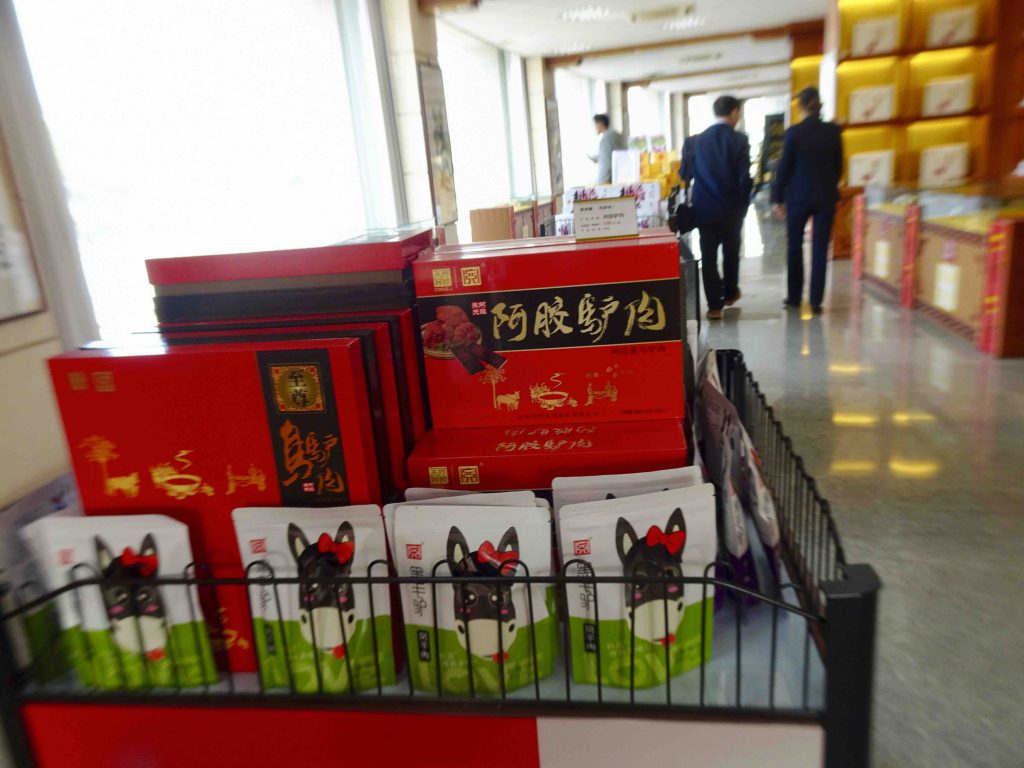
Ejiao products for sale in Hong Kong. Photo © George Knowles/Hong Kong
Chinese-Kitching abattoir
On April 24 Ghanzi farmer and lion breeder Chris Kitching told metro radio station Gabz FM that the abattoir on his farm had raised the daily slaughter rate from 30 to 50 donkeys. The abattoir was a partnership with Chinese nationals who were “recommended” to him by Southern District Council chairperson Kgopolo Stammere-Ramosesane, he said.
Stammere-Ramosesane is the ruling Botswana Democratic Party (BDP) area councillor for Mabutsane, one of the first three areas to be ravaged by Harare-base Chinese donkey-hide dealer Hongde in February 2016.
Kitching said donkey carcasses were fed to his lions and the hides were salted and dried in preparation for export through Zimbabwe to Mozambique, for shipment to China. Due to brisk business, Kitching planned to set up a bigger abattoir at Hyena Field Farm, a property he owns in the Central Kalahari Game Reserve.
Attempts by Oxpeckers to get comment from Kitching and Stammere-Ramosesane were unsuccessful.
Bo Chang Group
In its edition of April 9, online business services publication The Northern Advertiser ran the following advert: “OPENING 18 April at BCG Farm NQ14, Tati Farms, Francistown, Bo Chang Group (Proprietary) (Limited)… We are the only licensed company in Botswana for donkey slaughtering. We buy donkeys from Batswana at a reasonable price. If you are interested, please contact us or visit us, Tati Farms along Mathangwane road.”
Six months prior to the opening, the Bo Chang Group had started recruiting management and factory staff – more than a month before the government licensed donkey abattoirs in September 2016.
The staff the abattoir wanted included a general manager, purchasing manager, a finance manager (fluent in Chinese), an electrician-cum-welder and a skin-salt technician, according to its recruitment advert flighted on social media site Facebook on August 1 2016.
In April the abattoir started operations with the export of 189 donkey hides. The figure rose to 307 in May, and almost doubled to 588 in June, while neighbours started noticing vultures and the smell of rotting flesh coming from Tati Farm NQ14.
Acting on a tip-off about inhumane holding, slaughter and disposal of flesh, an inter-ministerial task-force raided Bo Chang abattoir late in June and found 452 starved and emaciated donkeys penned up for slaughter.
Hundreds of rotten carcasses were found dumped in makeshifts pits, with fluids seeping into the Tati River, a lifeline for the city of Francistown and communities further downstream. Most of the donkeys were euthanised on humanitarian grounds.
Five Zimbabwean immigrants who worked illegally at the abattoir were arrested. Of the three Chinese operators, an unnamed 24-year-old man was fined P50 for animal cruelty.
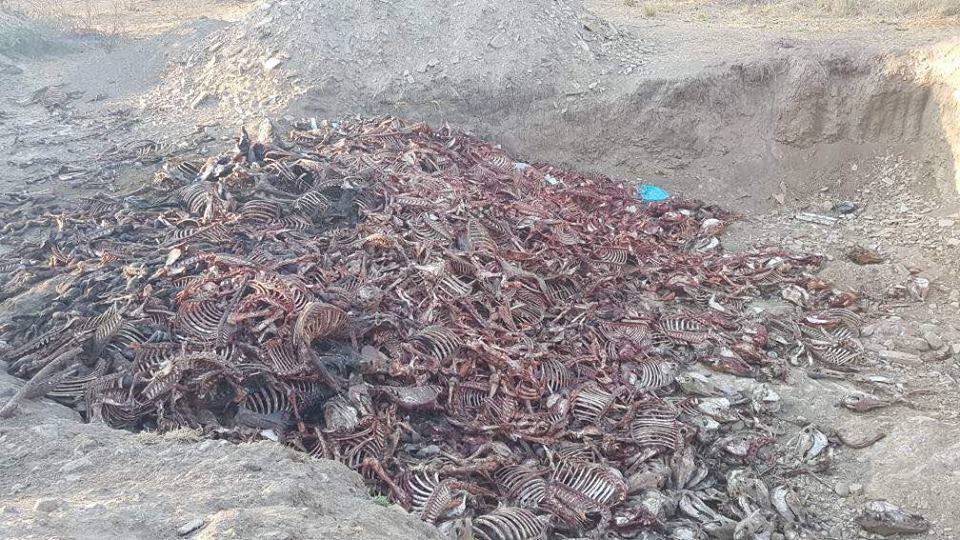
Hundreds of carcasses were found dumped in makeshift pits at the Bo Chang abattoir in Francistown, with rotting fluids seeping into the main river
Temporary trade ban
Alarmed at the cruel treatment and slaughter of donkeys at Bo Chang, on June 28 the government temporarily suspended all licences for the slaughter and export of donkeys and products, specifically meat and hides.
“The public and abattoir operators are informed that the slaughter of donkeys is suspended with immediate effect until further notice. All abattoir licences issued to the operators are therefore withdrawn with immediate effect,” the Ministry of Agricultural Development and Food Security said in a statement.
Ministry spokesman Geoffrey Pheko said the government had “noted with concern the indiscriminate and cruel slaughter of donkeys for their hides, which are exported to lucrative markets in Asia”.
However, activists believe the seizure of another Zimbabwean-bound truckload of 1,200 donkey hides on a road leading to Bo Chang abattoir in mid-August proved that the slaughter of donkeys has not stopped.
“The ban has not stopped the donkey products trade. It has simply gone underground and donkeys are now being slaughtered in the bush,” said one activist who asked not to be named.
The temporary ban on the trade in donkey products and increased public awareness of the impacts of the donkey trade are some of the factors driving the trade underground, he said.
Donkey pitsos
On August 20 the government called a series of public meetings – titled “donkey pitsos”, or gatherings – to discuss amendments to the Animal Cruelty Act of 1936, to afford better protection to donkeys and horses.
Agricultural Development and Food Security Assistant Minister Kgotla
Autlwetse said the meetings would be held in Maun, Francistown, Serowe, Molepolole and Kang from August 29.
The government estimates that 10% of Botswana’s population of 227,000 donkeys is vulnerable to illegal slaughter annually, he said.
“The welfare of donkeys is compromised. This is a concern to us, hence the urgent need for the development of a welfare code for donkeys and horses,” he said. – oxpeckers.org
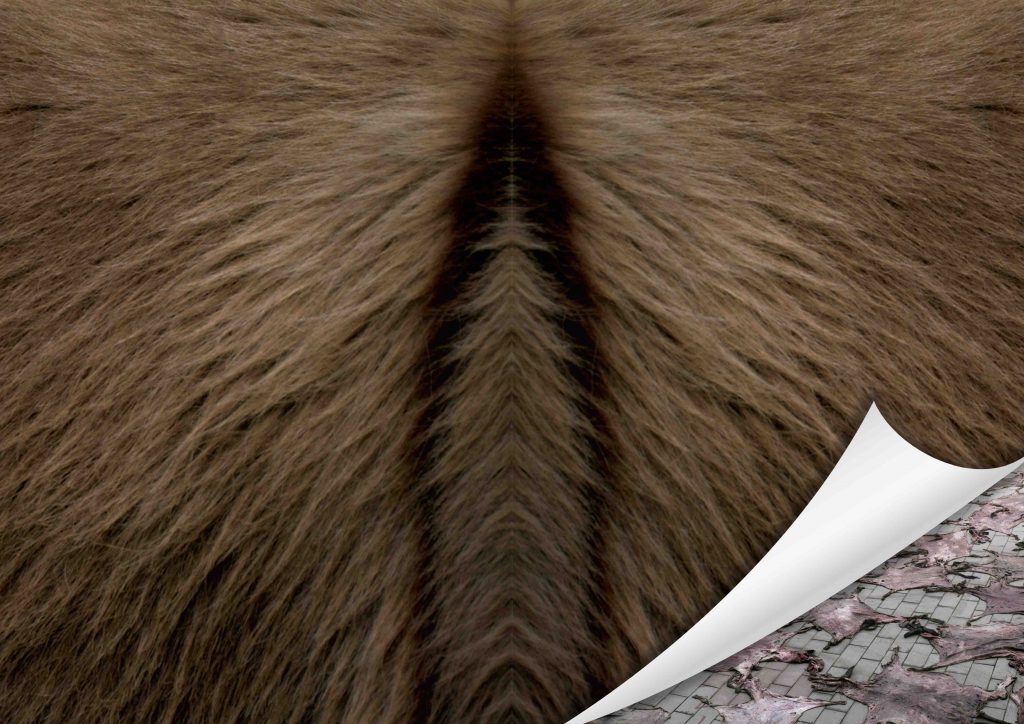
Under the Skin: This series of investigations into Southern Africa’s donkey trade is produced by Oxpeckers Investigative Environmental Journalism in collaboration with The Donkey Sanctuary
